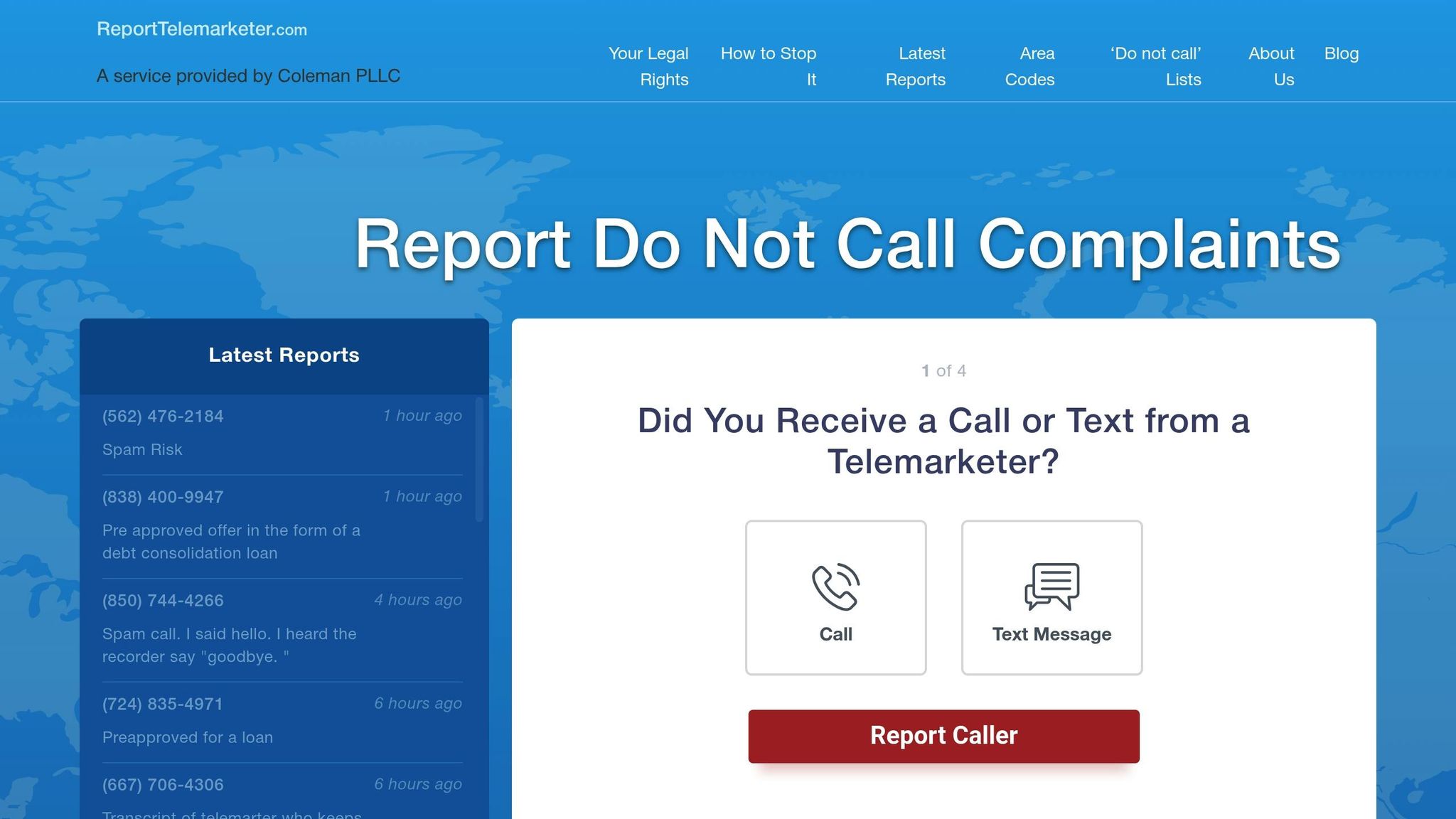
If you’ve ever been annoyed by robocalls or spam texts, here’s some good news: under the Telephone Consumer Protection Act (TCPA), you could receive up to $1,500 per illegal call or text. This federal law protects your privacy, enforces strict rules for telemarketers, and allows you to take legal action – even without proving financial harm.
Key Points:
- Penalties: $500 per call, increasing to $1,500 for willful violations.
- Violations: Sending calls or texts without consent, ignoring Do Not Call requests, or using autodialers improperly.
- Legal Action: Courts award damages for each violation, often through class action lawsuits.
- Example Case: Consumers received $1,500 per call after a company knowingly broke TCPA rules.
This law doesn’t just compensate victims – it forces companies to rethink their practices, protecting others from similar disruptions. Services like ReportTelemarketer.com can help you document violations, file claims, and fight back without upfront costs. If telemarketers are ignoring your rights, you have the tools to hold them accountable.
Case Facts: What Happened and Which Laws Were Broken
TCPA Rules and Penalty Amounts
The Telephone Consumer Protection Act (TCPA) enforces strict penalties to prevent unauthorized communication practices. Under this law, companies face fines of $500 per unauthorized call, which can increase to $1,500 per call if the violation is deemed willful or intentional. This higher penalty applies when businesses knowingly disregard TCPA rules or continue making calls after being explicitly asked to stop.
The TCPA requires companies to obtain prior express written consent before using automated systems or sending prerecorded messages to cell phones. Additionally, businesses must maintain a Do Not Call list and promptly honor any consumer requests to be removed from their contact lists.
Automated dialing systems, often referred to as autodialers, are tightly regulated under the TCPA. These systems, which generate phone numbers using random or sequential methods, cannot contact cell phones without the proper consent. Even if a live agent eventually takes over the call, the initial use of an autodialer without authorization still constitutes a violation of federal law.
Each unauthorized call is treated as an individual infraction, meaning noncompliance can lead to steep cumulative penalties. These provisions highlight the importance of adhering to TCPA regulations, as violations can quickly escalate in both scale and financial consequences.
Company Actions and Consumer Harm
The defendant’s actions clearly violated the TCPA by disregarding both consent requirements and restrictions on automated systems. Using an autodialer, the company sent prerecorded messages to cell phones without prior consent, breaching multiple provisions of the law. To make matters worse, the calls persisted even after consumers explicitly requested removal from the contact list.
Consumers reported that these repeated, unsolicited calls disrupted their daily lives, causing significant inconvenience and frustration.
Key evidence, including phone records, revealed the systematic nature of the defendant’s campaign. Internal documentation further exposed the company’s failure to obtain proper consent and maintain an accurate Do Not Call list. Worse still, records showed a deliberate disregard for TCPA rules, which led to the violations being classified as willful. This classification justified the maximum penalty of $1,500 per call for the infractions.
Legal Steps: From Lawsuit Filing to $1,500 Per Call Settlement
Filing the Lawsuit and Proving Violations
Consumers who received unauthorized calls started by documenting each instance carefully. With this evidence in hand, they sought help from experienced TCPA attorneys. These legal experts reviewed the call records and compiled the evidence needed to demonstrate clear violations of the Telephone Consumer Protection Act (TCPA).
Class Action Setup and Evidence Gathering
After establishing initial claims, attorneys took things further by consolidating these individual cases into a class action. Using Federal Rule of Civil Procedure 23, they grouped similar violations into a single lawsuit. This method not only streamlined the process but also made collecting and presenting evidence more efficient.
Settlement Talks and Court Approval
With undeniable evidence in place, attorneys entered settlement negotiations. The result? A $1,500 per call settlement for affected individuals. The court reviewed and approved the agreement, ensuring fair compensation for everyone involved. This case served as a strong example of how TCPA protections can be upheld effectively.
Settlement Money: How Funds Are Divided
How Settlement Money Is Split
Once a settlement receives court approval, the process of dividing the funds begins. The first step is to allocate money for legal and administrative fees. After these expenses are covered, the remaining funds are distributed to consumers. For most settlements, a significant portion of the funds is earmarked for per-call payments to class members who can demonstrate they received unauthorized calls. This structured approach determines how individual payments are calculated.
To ensure accuracy and fairness, administrators verify claims using phone records, which helps prevent fraudulent claims and ensures the funds are distributed properly.
Consumer Payments: How $1,500 Per Call Is Calculated
Under the TCPA, the penalty for unauthorized calls starts at $500 per call. However, if the violation is deemed intentional or willful, this amount triples to $1,500 per call.
The severity of the violation plays a crucial role in determining whether the higher penalty applies. A powerful example is the case of Araceli King from Texas. In July 2015, she was awarded $229,500 from Time Warner Cable after receiving over 150 robocalls in less than a year. Astonishingly, an additional 74 calls were made after she filed her lawsuit, leading the judge to label these actions as:
"particularly egregious violations of the TCPA".
To calculate compensation, administrators multiply the verified number of unauthorized calls – confirmed through phone logs, carrier records, and testimony – by $1,500. This method ensures victims are fairly compensated while sending a strong message to deter future violations of the TCPA.
sbb-itb-a8d93e1
Consumer Benefits: How Settlements Protect and Pay Victims
How Legal Action Helps Consumers
TCPA settlements bring more than just individual payouts – they act as a powerful tool to hold corporations accountable. For most people, pursuing legal action alone isn’t feasible due to the time, cost, and complexity involved. But class action lawsuits change the game. By banding together, consumers can challenge even the biggest companies and send a clear warning to the telemarketing industry: violations come with real consequences.
The stakes are high. Companies can face penalties of up to $1,500 per illegal call, and when settlements climb into the hundreds of thousands – or even millions – corporate compliance teams take notice. These financial hits often lead to better training programs, stronger consent verification systems, and tighter controls over calling practices.
Beyond financial penalties, settlements often include court-ordered changes to how companies operate. These changes, known as injunctive relief, aren’t limited to lawsuit participants – they benefit all consumers. Companies may be required to maintain accurate do-not-call lists, secure proper consent before making calls, and establish clear opt-out processes. Services like ReportTelemarketer.com further amplify these protections, giving victims additional tools to combat unwanted calls.
How ReportTelemarketer.com Helps Victims

Building on the foundation of legal action, ReportTelemarketer.com provides a free, accessible service for anyone dealing with unwanted calls or texts. By eliminating financial barriers, it ensures that every consumer has the chance to take action against companies violating TCPA rules.
When consumers report unwanted calls through the platform, the service uses advanced tools to thoroughly investigate potential violations. Many people don’t realize they may have valid claims worth $500 to $1,500 per unauthorized call, and this investigative process helps uncover those opportunities.
The platform’s legal team specializes in telemarketing cases and can take action on behalf of consumers. Whether it’s filing cease and desist letters or formal complaints, this professional representation makes a difference. Telemarketing companies often ignore complaints from individuals but are far more responsive to formal legal threats.
What’s more, ReportTelemarketer.com operates on a contingency basis. Consumers don’t pay anything upfront – attorney fees are recovered from the violating telemarketers when the case is successful. This setup ensures that anyone, regardless of their financial situation, can seek justice.
The service also offers educational resources to help consumers understand their rights under TCPA. For example, many people aren’t aware that certain types of calls require written consent or that they’re entitled to compensation for violations. By providing this knowledge, ReportTelemarketer.com empowers consumers to take control and demand accountability.
10 Most Expensive TCPA Lawsuit Settlements and How to Avoid Them with Compliance Tools
Conclusion: Turning Telemarketing Violations Into Consumer Wins
The Telephone Consumer Protection Act (TCPA) gives consumers a powerful tool: the ability to sue telemarketers for up to $1,500 per unauthorized call.
This isn’t just about compensation – it’s about driving meaningful change. By holding companies accountable, TCPA penalties push businesses to rethink their practices and prioritize consumer privacy. The financial consequences act as a wake-up call, encouraging compliance and respect for the law.
Class action lawsuits amplify this impact. They allow everyday people to take on massive corporations, often resulting in impactful settlements. On top of that, services like ReportTelemarketer.com make justice more accessible. By providing free investigations and legal support – while recovering attorney fees from the telemarketers themselves – they ensure victims can fight back without worrying about upfront costs.
Thanks to strong TCPA protections and resources like these, consumers can transform telemarketing violations into opportunities to enforce their rights and demand accountability.
FAQs
How can I tell if a telemarketing call violates the TCPA?
To figure out if a telemarketing call broke the rules under the TCPA (Telephone Consumer Protection Act), here are some key points to check:
- Consent: Did the caller use an autodialer or a prerecorded message to reach your cell phone without your prior express consent?
- Do Not Call Registry: Was your number called even though it’s listed on the National Do Not Call Registry?
- Timing: Did the call come in outside the allowed hours of 8 a.m. to 9 p.m. local time?
- Opt-Out Option: Did the caller fail to offer a clear way for you to opt out of future calls?
If you think a call violated the TCPA, make sure to document the details. Keep track of the date, time, phone number, and any messages left. This information can be crucial if you decide to take action to protect your rights or seek compensation under the law.
How can I file a claim for unauthorized telemarketing calls under the TCPA?
To file a claim under the TCPA for unauthorized telemarketing calls, start by keeping a thorough record of each call. Write down the date, time, and any details you can gather about the caller, such as their phone number or the company they represent. This information will be key to supporting your case.
Once you’ve documented the calls, you can report them to the FCC by submitting a complaint through their official website or other designated channels. If the calls continue, or if you feel your rights have been violated, it may be time to consult a TCPA attorney. An attorney can explain your legal options and help you pursue compensation. Under the TCPA, consumers may be entitled to up to $1,500 per call for violations.
For additional help, platforms like ReportTelemarketer.com can assist in investigating and taking action against telemarketers who break the law.
What are the benefits of a class action lawsuit for consumers in TCPA cases compared to filing individually?
Class action lawsuits under the Telephone Consumer Protection Act (TCPA) provide a powerful way for consumers to fight back against illegal telemarketing practices. Instead of filing individual claims, people can band together to pursue damages – potentially up to $1,500 per violation. This collective effort not only boosts the total recovery amount but also increases the likelihood of holding telemarketers accountable for their actions.
Another key benefit of class actions is efficiency. By combining similar claims into a single case, legal costs for individuals are significantly reduced, and the process becomes more streamlined. Plus, large settlements or judgments – sometimes reaching hundreds of millions of dollars – send a strong message to violators, reinforcing consumer rights and discouraging future violations.